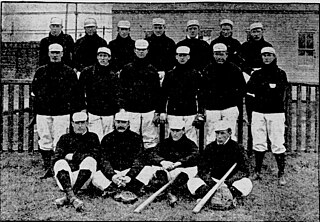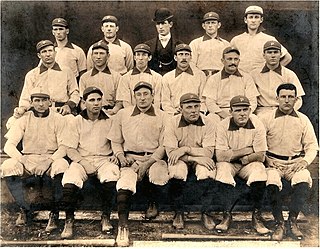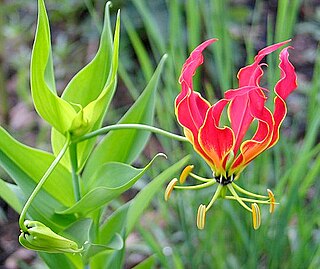
Krill are small crustaceans of the order Euphausiacea, and are found in all the world's oceans. The name "krill" comes from the Norwegian word krill, meaning "small fry of fish", which is also often attributed to species of fish.
Uwe Kils is a German marine biologist specializing in Antarctic biology.

The hybrid elm cultivar Ulmus × hollandica 'Superba' is one of a number of intermediate forms arising from the crossing of the Wych Elm U. glabra with a variety of Field Elm U. minor. Boulger tentatively (1881) and Green more confidently (1964) equated it with a hybrid elm cultivated in the UK by Masters at Canterbury in the early 19th century, known as "Masters' Canterbury Seedling" or simply the Canterbury Elm. Loudon examined a specimen sent by Masters and considered it a hybrid, calling it U. montana glabra major.
The 1910 Brooklyn Superbas hired Bill Dahlen as the new manager, but still finished in a dismal sixth place in the National League.
The 1909 Brooklyn Superbas handed the manager's job over to outfielder Harry Lumley. However, the team finished in sixth place again and Lumley's playing stats took a tumble as he tried to do both jobs. He was replaced as manager after the season and traded as a player halfway through the next season.
The 1908 Brooklyn Superbas suffered through another poor season, finishing in seventh place. After the season, manager Patsy Donovan was fired. The club set a Major League record which still stands, for the fewest doubles by a team in a season, with only 110.
The 1907 Brooklyn Superbas finished in fifth place, with another losing season.
The 1906 Brooklyn Superbas saw Patsy Donovan take over as the team's manager. However, another poor season led to a fifth-place finish.
The 1905 Brooklyn Superbas fell to last place with a franchise-worst 48–104 record, costing manager Ned Hanlon his job.
The 1904 Brooklyn Superbas finished in sixth place with a 65–97 record.
The 1903 Brooklyn Superbas season was a season in Major League Baseball. The Superbas began their slide from contention in the National League by finishing in fifth place.
The 1902 Brooklyn Superbas finished in a distant second place in the National League, 27 and 1/2 games behind the Pittsburgh Pirates.

The 1901 Brooklyn Superbas lost several players to the newly official major league, the American League, and fell to third place.
The 1900 Brooklyn Superbas captured their second consecutive National League championship by four and a half games. The Baltimore Orioles, which had been owned by the same group, folded after the 1899 season when such arrangements were outlawed, and a number of the Orioles' players, including star pitcher Joe McGinnity, were reassigned to the Superbas.
The 1899 Brooklyn Superbas season was the 16th season of the current-day Dodgers franchise and the 9th season in the National League. The team won the National League pennant with a record of 101–47, 8 games ahead of the Boston Beaneaters, after finishing tenth in 1898.

The 1900 Pittsburgh Pirates season was the 19th season of the Pittsburgh Pirates franchise. The Pirates finished second in the National League with a record of 79–60.

Gloriosa superba is a species of flowering plant in the family Colchicaceae. Common names include flame lily, climbing lily, creeping lily, glory lily, gloriosa lily, tiger claw, and fire lily.
Chrysochlorosia callistia is a moth of the subfamily Arctiinae. It is found in Bolivia.
Chrysochlorosia magnifica is a moth of the subfamily Arctiinae. It is found in Costa Rica.

The putative Wych Elm cultivar Ulmus glabra 'Superba' was first described in 1848 by Morren, as U. montana var. superba, an elm with unusually large leaves. Morren had adopted the name 'Superba' from the Fulham nurseryman Osborne in 1844, who supplied him with the tree. Morren states that 'Superba', already in cultivation in England, was introduced to Belgium by Denis Henrard of Saint Walburge, Liège, that in 1848 it had been present in Belgium for only three years, and that this variety was the one described as 'Superba' by Osborne, whom Henrard had visited at his nursery in Fulham in September 1844. Gill's of Blandford distributed an U. montana superba at much the same time – from 1845 – known to some nurseries as Blandford Elm, with large leaves of the same dimensions.







